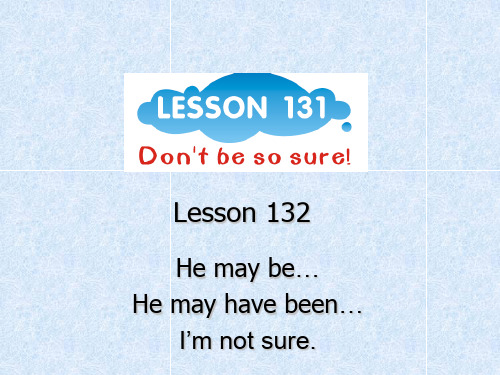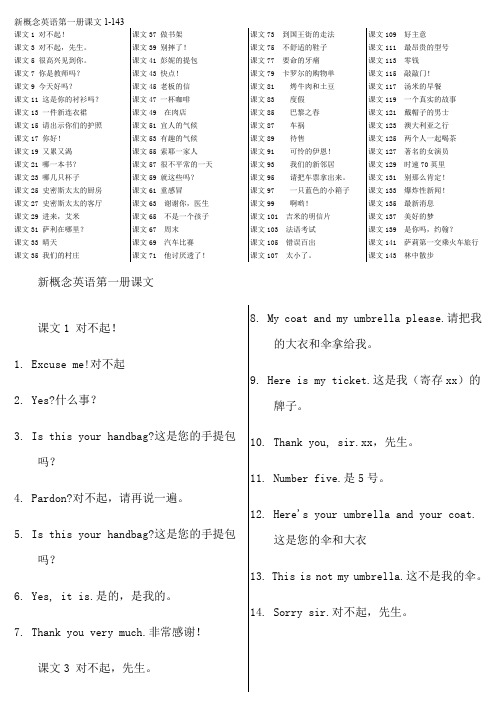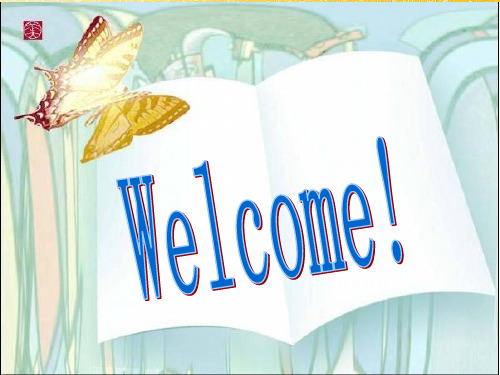新一L13~14
新概念第一册Lesson131-132(28张PPT)

Notes on the text 课文注释 1 We may go abroad. 我们可能去国外。 在英文中用may来表示可能发生的事情,在may后面加动词原形。 请注意may表示的是一种可能性,这与第127课所讲的表示有根据 的推论是有区别的。
2 make up our minds, 打定主意。 3 Don't be so sure. 别那么肯定。 在祈使句中,be动词的否认形式要用don't be,这种结构常常用于 劝告。
GARY:We may go abroad. I'm not sure. My wUifneiwt 6a6nts to go to Egypt. I'd like to go there, too. We can't make up our minds.
1、情态助动词may表示可能性“可能,也许,或许“ may和might都表示“可能、也许〞,might所表示的可能性要比 may小,且当情况是虚拟时只能用might而不能用may。 may表示现在或将来的可能性:may+动词原形
相当于decide,常跟to do sth. 表示决心或决定 去做某事。
Unit 66
MARTIN:Will you travel by sea or by air? 1、选择疑问句,要求答话人在两个或多个人或事物中作出选择,不能用yes或no 作答复. Would you like some bananas or apples? 你想吃香蕉还是苹果? MARTIN:It's cheaper, isn't it? It's cheaper. = It`s cheaper to travel by sea than by air. isn't it? 与前面的陈述句一起构成反意疑问句。结构为:陈述句+反意的简略式疑问句。 反意疑问句要用yes或no来答复,肯定与否根据事实来确定,不受问句中肯定与 否认的影响。 —You are a student , aren`t you? 你是学生,不是吗?—Yes ,I am. 是的,我是 。 —No, I`m not. I am a teacher. 不,我不是,我是一位老师。
新概念英语第一册L113-114

二流浪汉:我们俩除外。 TWO TRAMPS: Except us. 流浪汉1:我又零钱。 1sth TRAMP: I‘ve got some small change. 流浪汉2:我也有。 2nd TRAMP: So have I. except (prep. ) + 宾格 “除…… 外” 除了Tom,每个人都能回答这个问题。 Everyone can answer this question except Tom. 除了她我们都喜欢打篮球 We all like playing basketball except her. 当别人说的肯定的话也适用于你时,可以用这样的简略说法 结构:So + be/情态动词 / 助动词 +主语 我喜欢这本书。 I like this book。 我也喜欢。 So do I. EX. D
Retell
MAN: I've got no small change, I'm afraid. CONDUCTOR: I'll ask some of the passengers. CONDUCTOR: Have you any small change, sir? 1st PASSENGER: I'm sorry. I've got none. 2nd PASSENGER: I haven't got any either. CONDUCTOR: Can you change this ten-pound note, madam? 3rd PASSENGER: I'm afraid I can't. 4th PASSENGER: Neither can I.
fare [fεə] n.车费,车票
2024年新概念英语L133-135直引变间引课件

“Do you know my name?”
是否
She asked me Whether / if I knew her name.
“Are you at home yesterday?” She asked me Whether / if I was at home
the day before.
直接引语变间接引语可分为三大类:
1)直接引语为陈述句 2)直接引语为疑问句(一般疑问句、特殊 疑问句) 3)直接引语为祈使句
陈述句: 连词(that)引导,that常省略
e.g. He often says,“China is great.” → He often says (that) China is great. Tom says,“I am a student.” → Tom says (that) he is a student. He says,“I leave my book in your room”
3. He said, “I’ll come here this morning.” He said he__w_o__u_ld_ go there that morning
4. He says, “I have finished my homework.” He says that he _h__a_d_f_in_i_s_h_e_d his homework.
3)My teacher said, ‘‘ she is a good student. ’’ My teacher said __s_h_ewas a good student
4) He said to me,“ I’ve left her book in your room”
新概念英语第一册课文1-143

课文1 对不起!课文3 对不起,先生。
课文5 很高兴见到你。
课文7 你是教师吗?课文9 今天好吗?课文11 这是你的衬衫吗?课文13 一件新连衣裙课文15 请出示你们的护照课文17 你好!课文19 又累又渴课文21 哪一本书?课文23 哪几只杯子课文25 史密斯太太的厨房课文27 史密斯太太的客厅课文29 进来,艾米课文31 萨利在哪里?课文33 晴天课文35 我们的村庄课文37 做书架课文39 别摔了!课文41 彭妮的提包课文43 快点!课文45 老板的信课文47 一杯咖啡课文49 在肉店课文51 宜人的气候课文53 有趣的气候课文55 索耶一家人课文57 很不平常的一天课文59 就这些吗?课文61 重感冒课文63 谢谢你,医生课文65 不是一个孩子课文67 周末课文69 汽车比赛课文71 他讨厌透了!课文73 到国王街的走法课文75 不舒适的鞋子课文77 要命的牙痛课文79 卡罗尔的购物单课文81 烤牛肉和土豆课文83 度假课文85 巴黎之春课文87 车祸课文89 待售课文91 可怜的伊恩!课文93 我们的新邻居课文95 请把车票拿出来。
课文97 一只蓝色的小箱子课文99 啊哟!课文101 吉米的明信片课文103 法语考试课文105 错误百出课文107 太小了。
课文109 好主意课文111 最昂贵的型号课文113 零钱课文115 敲敲门!课文117 汤米的早餐课文119 一个真实的故事课文121 戴帽子的男士课文123 澳大利亚之行课文125 两个人一起喝茶课文127 著名的女演员课文129 时速70英里课文131 别那么肯定!课文133 爆炸性新闻!课文135 最新消息课文137 美好的梦课文139 是你吗,约翰?课文141 萨莉第一交乘火车旅行课文143 林中散步新概念英语第一册课文课文1 对不起!1. Excuse me!对不起2. Yes?什么事?3. Is this your handbag?这是您的手提包吗?4. Pardon?对不起,请再说一遍。
新概念英语一册113-114课习题

Lesson113 Small change 零钱一、填空1.零钱2.车费3.下车4.流浪汉5.乘客6.我恐怕7.百万富翁8.除了我们9.我也一样10.我不能找开100圆钱二、从下面A、B、C三个选项中选出正确的答案,并把正确的字母编号写在括号里。
( )1. I didn’t like this cross talk program, _____ of the actors was funny.A. BothB. AllC. Neither( )2. There is ____ cooking oil left in the house. Would you go to the supermarket and get _______.A. little / someB. little /anyC. few/ some( )3. So ____ homework really makes student s feel tired.A. manyB. muchC. little( )4. Have you got any other clothes ______these.A. besidesB. exceptC. except for( )5. They all went to Summer Palace _____Dina.A. besidesB. except C .except for( )6. ______ Jenny, everyone admires him for his great sense of humor.A.ExceptB.BesidesC.Both( )7. On _____ side of the river there are a lot of the river there are. What a great world.A. eitherB. neitherC. both( )8. You may ______ stay or go.A. eitherB. neitherC. both( )9. Either you or I _____ wrong.A. amB. areC.is( )10. He has _____brother at all.A. notB. noC.none( )11. Mr. Watson won’t be here next week, and ____________.A. neither his wife willB. neither his wife won’tC. his wife won’t neither( )12. ---Are there any picture on the wall? ---_________.A. NotB. NoC. None( )13._____ she and I are going to do the cleaning.A. EitherB. NeitherC. Both( )14. He ________ drinks nor smokes.A. eitherB. neitherC. both三、阅读理解Mr. Ling lives in china .He worked in a factory and last year retired. His wife died five years ago and his son works in Japan. He always has sports and he is in good health. One day his son called himand asked him to have a journey to Tokyo. He was very happy. He was afraid to travel by plane and took the ship. On the first morning on the ship Mr. Ling met an Englishman at table. The man said to him,” good morning!” He thought the Englishman told his name to him. So he stood up and said,”Li B ing” And it was repeated a few mornings and Mr. Ling told a teacher about it. Hearing him, the teacher began to laugh and said,” he says hello to you in the morning. ”The next morning, when Mr. Ling met the Englishman, he said, ”Good morning ”And the Englishman stood up and said, ”Ling Bing, sir”( )1. What did Mr. Ling do?A. A sports loverB. A farmerC.A worker( )2. The old man stays at home_______.A. with his wifeB. with his sonC. with( )3. Mr. Ling went to Japan by ship because_______.A. he thought it was saferB. he wanted to have sports on the ship.C. he had little money to take a plane.( )4. The old man told his name to the Englishman because______.A. he hoped to make friends with himB. he wanted to say hello to him, too.C. he thought “Good morning” was his name( )5. Which of the following is true? _____________A. Mr. Ling began to study English on the ship.B. The Englishman thought “Ling Bing” meant “Good morning” in Chinese.C. The old woman began to teach Mr. Ling四、翻译句子1. 夫人,您能找开一百元钱么?2. 我们中没有人是百万富翁.3. 流浪汉通常是可怜的.4. 到天安门是在这里下车么?5. 我身上一分钱也没有.。
新概念英语1L13-14

Listen to the tape then answer this question: What colour is Anna's hat?
Louise: What colour's your new dress? Ann: It’s green. Come upstairs and see it. Louise: Thank you. Ann: Look! Here it is! Louise: That’s a nice dress. It’s very smart. Ann: My hat’s new , too. Louise: What color is it? Ann: It’s the same color. It’s green, too. Louise: That is a lovely hat!
2.This is Sophie. This is her coat.
3.This is Helen.This is her dog.
4.This is my father. This is his suit.
5.This is my daughter. This is her dress.
1.They are
主格人 宾格人称代
称代词
词
物主代词
形容词性 物主代词
I
me
my
you
you
your
he
him
his
she
her
her
Make sentences Example:This is Stella This is Stella's handbag.
This is her handbag.
1.This is Paul. This is his car.
新概念英语第一册Lesson141142Sally'sfirsttrainride小学英语初中英语全
Vocabulary
词汇精讲
embarrassed [ɪmˈbærəst] adj. 尴尬的
amused [əˈmjuːzd] adj. 有趣的
excited [ɪkˈsaɪtɪd] adj. 激动的 , 兴奋的
↓ 形容人
embarrassing adj. 让人为难的 , 尴尬的
amusing adj. 有趣的 , 惹人发笑的
e.g. Sue dressed herself neatly for work. Sue准备去工作 , 把衣服穿得很整齐 。
Language Point
语句讲解、课文讲解
e.g. Mummy bathed Helen and dressed her in a pretty dress. 妈妈给Helen洗了一个澡 , 然后呢 , 给她穿上了一件漂亮的裙子。
Vocabulary
词汇精讲
curious
adj. 好奇的
e.g. I am curious to know where he is stay? 我好奇地想知道他住在哪里?
curious + ly = adv. 好奇地 修饰动词 e.g. He look at me curiously. 他好奇地看着我。
↓ 主语的单复数、 句子的时态
Language Point
语句讲解、课文讲解
Does anyone ever open this window? (一般现在时、 疑问句) 有没有人开过这扇窗户? 主动回答 : Someone opens it regularly. 有人定期开这一扇窗。 regular : adj. 有规律的 , 定期的 regular + ly = regularly : adv. 定期地
新概念三册课文对照译文Lesson 14 A noble gangster 贵族歹徒
新概念三册课文对照译文Lesson 14 A noblegangster 贵族歹徒###新概念频道为大家整理的新概念三册课文对照译文Lesson 14A noble gangster 贵族歹徒,供大家参考。
更多阅读请查看本站频道。
课文原文A noble gangster贵族歹徒There was a tine when the owners of shops and businessesin Chicago that to pay large sums of money to gangsters in return for 'protection.' If the money was not paid promptly, the gangsters would quickly put a man out of business by destroying his shop. Obtaining 'protection money' is not a modern crime. As long ago as the fourteenth century, an Englishman, Sir John Hawkwood, made the remarkable discovery that people would rather pay large sums of money than havetheir life work destroyed by gangsters.Six hundred years ago, Sir Johan Hawkwood arrived inItaly with a band of soldiers and settled near Florence. He soon made a name for himself and came to be known to the Italians as Giovanni Acuto. Whenever the Italian city-states were at war with each other, Hawkwood used to hire hissoldiers to princes who were willing to pay the high price he demanded. In times of peace, when business was bad, Hawkwood and his men would march into a city-state and, after burning down a few farms, would offer to go away protection money was paid to them. Hawkwood made large sums of money in this way.In spite of this, the Italians regarded him as a sort of hero.When he died at the age of eighty, the Florentines gave him a state funeral and had a pictured with as dedicated to the memory of 'the most valiant soldier and most notable leader, Signor Giovanni Haukodue.'以前有一个时期,芝加哥的店主和商行的老板们不得不拿出大笔的钱给歹徒以换取"保护"。
新一提问
新一提问L1: 1. Whose handbag is it?2. What does the woman say at last?L3: 1. What does the man want?2. What’s the number of his ticket、3. Does the man get his umbrella back?L5: 1. How many students in their classroom?2. Who are they?3. What nationality are they?L7: 1. Where does Sophie come from? How about Robert?2. What is Robert’s job? How about Sopie?L9: 1. How is Helen?2. How is Emma?L11: 1. What colour is Dave’s shirt?2. Whose shirt is white?L13: 1. What colour’s Anna’s new dress?2. What colour’s Anna’s hat?L15: 1. What nationality are the girls? How about their friends?2. What colour are the girls’ cases?3. What are they/L17: 1. What are two women’s jobs?2. What are the men’s jobs?3. Who is hardworking? Who is lazy?L19: 1. What’s the matter of the children?2. What does their mother do for them/L21: 1. What does the man want?2. Which one does he want?L23: 1. What does the man want?2. Which ones does he want?L25: 1. What’s in her kitchen?2. What colour are they? Where are they?L27: 1. Is her living room big or small? What’s in her living room?2. Where are they?L29: 1. What must Amy do?(先交给孩子们做事的流程。
新一单词分类表V动词
顺成教育新概念一动词分类表L1. excuse v.原谅is v. be动词现在时第三人称单数thank you vt. 感谢L2. watch n.手表L5. meet v.遇见L7. am v. be动词现在时第一人称单数are v. be动词现在时复数L9. see v.见L11. catch v.抓住L13. come v.来L19. sit down 坐下动词L21. give v.给L29. must modal v. 必须,应该shut v.关门air v.使…通风,换换空气put v.放置dust v.掸掉灰尘sweep v.扫L30. empty v.倒空,使…变空read v.读sharpen v.削尖,使锋利put on 穿上take off 脱掉turn on 开(电灯) turn off 关(电灯)L31. climb v.爬,攀登run v.跑L32.type v.打字eat v.吃clean v.清洗cook v.做(饭菜) drink v.喝L33 .s hine v.照耀walk v.走路,步行fly v.飞L34. sleep v.睡shave v.刮脸cry v.哭,喊wash v.洗wait v.等jump v.跳L35. swim v.游泳L37.work v.工作paint v.上漆,涂L38. listen v.听L39.drop v.掉下lean out of 身体探出L40. show v.给…看send v.送给take v.带给L43. find v.找到boil v.沸腾,开L45.can verb.能够ask v.请求,要求L46. lift v.拿起,搬起,举起L47. like v.喜欢,想要want v.想L49. tell v.告诉L51. rain v.下雨snow v.下雪L52. rise v.升起L53. set v.(太阳)落下去L55.live v.住,生活stay v.呆在,停留arrive v.到达L61.must modal v.必须,应该feel v.感觉look v.看(起来) call v.叫,请remember v.记得,记住L63. remain v.保持,继续L64. play v.玩talk v.谈话drive v.开车break v.打破noise v.喧闹声L65. hear v.听见enjoy v.玩得快活,享受……的乐趣L67. keep v.(身体健康)处于(状况) spend v.度过stand v.站立;L71. answer v.接(电话) say v.说L73. understand v.懂,明白L74.cut v.割,切go v.走greet v.问候,打招呼L75. buy v.买wear v.穿着L79. need v.需要hope v.希望L83. pack v.包装,打包,装箱leave v.离开L87. bring v.带来,送来repair v.修理try v.努力,设法L89. believe v.相信,认为sell v.卖,出售cost v花费L91. move v.搬家miss v.想念,思念L93.return v.返回fly v.飞行L95. catch v.赶上miss v.错过L97. leave v.遗留describe v.描述belong v.属于L99.slip v.滑倒,滑了一脚all v.落下,跌倒hurt v.伤,伤害,疼痛help v.帮助stand up 起立,站起来L101. write v.写L103. pass v.及格,通过fail v.未及格,失败answer v.接(电话) hate v.讨厌cheer v.振作,振奋L105. spell v.拼写L106.carry v.携带correct v.改正,纠正keep v.保存,保留L107. suit v.适于L110. afford v.付得起(钱) change v.兑换(钱)L113. knock v.敲,打get off 下车L115. invite v.邀请joke v.开玩笑L117. swallow v.吞下happen v.发生enter v.进入L121. forget v.忘记serve v.照应,服务,接待recognize v.认识L123. travel v.旅行offer v.提供guess v.猜grow v.长,让…生长L125. water v.水mean v.意味着,意思是L127. read v.读L129.wave v.招手overtake v.从后面超越,超车dream v.做梦,思想不集中charge v.罚款speed 限速L131. worry v.担忧L135. introduce v.介绍get married 结婚L137. win v.赢depend v.依靠L141 smile v.微笑get on 登上L143. surround v.包围place v.放throw v.扔,抛count v.数,点cover v.覆盖prosecute v.依法处置。
- 1、下载文档前请自行甄别文档内容的完整性,平台不提供额外的编辑、内容补充、找答案等附加服务。
- 2、"仅部分预览"的文档,不可在线预览部分如存在完整性等问题,可反馈申请退款(可完整预览的文档不适用该条件!)。
- 3、如文档侵犯您的权益,请联系客服反馈,我们会尽快为您处理(人工客服工作时间:9:00-18:30)。
Key Structures
Exercise
cap
hat
Exercise
dress
jeans
Exercise
Exercise
词汇
• • • • • •
特殊疑问词
Whose 谁的 What 什么 Where 哪里 When 什么时候 Who 谁 Why 为什么 How 怎么样
学过的特殊疑问词
green
blue
red
yellow
grey black orange brown red green purple
pink orange black green
purple grey pink blue
orange brown
yellow
black
A: What colour’s your cap? B: It’s red. A: What colour’s Bella’s umbrella? B: Her umbrella’s white and black.
Home work:
1.13课课文抄写两遍,背诵签字 2.同步语法第13页4、5、6题做完
it's 代替的是 my new dress
It's green.
Language points
Come upstairs and see it.
其中的 “and” 不做和讲,它的 意思是引导目的
Come and help me. Come and clean the table.
Language points
4.What nationality is she ? d. It’s my red case . 5.How are you ? e. Tim brown . 6.How do you do ? f. She’s Korean . 7.what’s your name? g. It’s black .
Lesson 13
A new dress
colour green come hat same
New Words
颜色 绿色 来 帽子 相同的
New Words
upstairs smart lovely
上楼
downstairs
时髦的
fashion
可爱的
cute
Listening
Listen to the tape ,and then find out the answer.
That is a lovely hat!
“is” 重读,表示强调。比如说你 真忙啊,你确实很忙:You are busy! 说一个东西漂亮的、时髦的、好看的形 容词:nice, smart, lovely, cute, beautiful, good, pretty
Role Play
What colour’s your…
colour
the same colour
How does Louise think about the hat?
That is a lovely hat!
Language points
What colour's your new dress?
What colour's your shirt? It's white.
What are they talking about?
Louise Anna
What does Anna say?
upstairs
come upstairs
What dose Louise say?
nice smart
What does Anna do next?
hat new hat
What does Louise ask?
五. Match the questions and answers:
1.What color is your new dress? a. She’s a nurse .
2.Whose is this red case ?
b. How do you do ?
3.what’s her job ?
c. I’m very well ,thanks…
